All You Need To Know About Local Campaign Issues 2022

From the start, VREG does not endorse candidates. Instead, our goal is to keep you informed and to educate you wherever possible. As part of that commitment, we want to outline the critical campaign issues facing City Council candidates in 2022.
If you live in Districts 1, 4, 5 or 6, you have a critical decision to make in this election. Your choice for City Councilmember will shape Ventura’s future for decades. How the candidates address the current campaign and the issues that confront our community today should guide your selection.
Meet Your 2022 City Council Candidates
First, familiarize yourself with the candidates. Campaigning has changed in the COVID-19 environment, so you may not be able to meet your candidates in person.
Incumbent Councilmembers Mayor Sofia Rubalcava and Jim Friedman have chosen not to run for another term. That means Districts 1 and 5 will have new representation. Voters in those districts should try to meet their candidates.
Three contenders have emerged to challenge incumbent Councilmember Lori Brown in District 6.
District 1
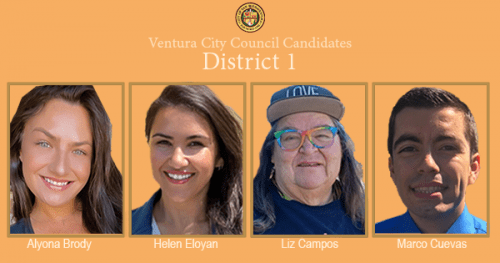
District 4
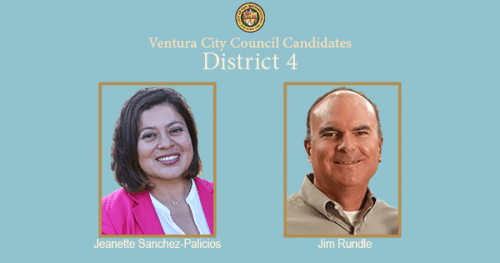
District 5
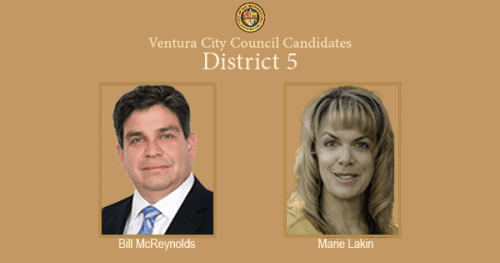
District 6
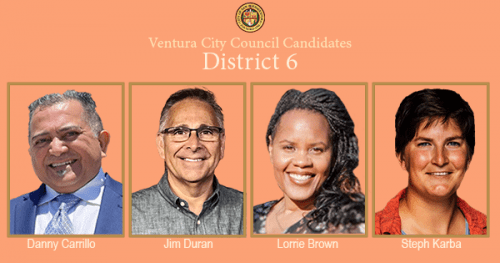
Ventura’s Key Campaign Issues In 2022
What campaign issues do you want your candidate to address? Your answer may depend on the district you live in but, regardless of your district, there are some citywide issues every candidate must address.
Water Is Among The Top Campaign Issues
 Water and wastewater treatment will be among the costliest issues the City Council and, ultimately, you will face in the next four years. Ventura Water is asking the Council for over $259 million to complete VenturaWaterPure, making it as expensive to the city as public safety.
Water and wastewater treatment will be among the costliest issues the City Council and, ultimately, you will face in the next four years. Ventura Water is asking the Council for over $259 million to complete VenturaWaterPure, making it as expensive to the city as public safety.
Ventura Water convinced the City Council to raise water and wastewater rates by 43% to pay for the project. They claimed the benefits would be another reliable water source by 2025 and, by doing so, we would comply with the Wishtoyo Consent Decree of 2012. Their message was that “your wastewater” would be the “reliable water source.”
Since the Council agreed to the rate increase, the project has had several significant changes. First, the city relieved the supervisorial duties over VenturaWaterPure from then-Ventura Water General Manager Susan Rungren and turned them over to Linda Sumansky inside the City Manager’s office. While the change sounds trivial, it isn’t. Placing VenturaWaterPure under the oversight of the City Manager’s office takes water and wastewater decisions away from trained engineers and water employees and turns them over to politicians.
Despite losing oversight of WaterPure, Ms. Rungren kept the same salary as she had when she was solely in charge of the project. She has since retired at that elevated salary level, adding to the city’s unfunded pension obligation.
Second, Ventura Water reduced the scope of VenturaWaterPure significantly. Ventura Water will no longer build a state-of-the-art water treatment plant by 2025 to provide the reliable water it promised. Instead, they will treat the wastewater and dump it into the ocean. As a result, what’s known as the Ocean Outfall will be completed by 2025 to fulfill the 2012 Consent Decree. The advanced water treatment plant will be completed by 2030 if all goes according to the revised plans.
Third, the Water Commission approved none of the changes to the plan for VenturaWaterPure. Ventura Water is taking the changes to the City Council, circumventing the Water Commission’s input.
VREG pushed for a Water Commission to review and evaluate Ventura Water’s plans before taking them to the City Council. Commissioners should be people with more expertise in water matters than the City Councilmembers. The Council intended to pass water issues by the Commission before they went to the City Council when it formed the Commission. When it comes to VenturaWaterPure, however, Ventura Water appears to be bypassing that established procedure.
The last Water Commission meeting was May 24, 2022, with their next meeting scheduled for Sept. 27, 2022. It’s hard to say that the Commission is well-informed when it hasn’t met for over 120 days. To make matters worse, when they meet, Ventura Water uses the Brown Act to limit and control the agenda, so the Water Commission cannot get data, discuss details or have timely information.
Politicians Control WaterPure, Not Trained Professionals
Any discussion about water in Ventura should be about the cost of producing and delivering water to the citizens of Ventura. And that cost is rising. Ventura Water presented to a VenturaWaterPure Ad Hoc committee in August 2022. Ventura Water stated the planned expenditures would increase another $76 million, bringing the entire project to over $373 million. There needs to be more than the 43% water rate increase approved two years ago to cover the higher costs. Ventura Water will request another rate increase, most likely.
Find out from your candidates where they stand on VenturaWaterPure. How much do your candidates understand the litigation the city is involved in over water issues? Do they know what alternatives exist to the Wishtoyo Consent Decree of 2012? Do they know about the Ventura River litigation and the cross-complaint Ventura filed against 10,000 property owners along the river to determine water rights on the river?
Homelessness and Vagrancy Are Important Campaign Issues
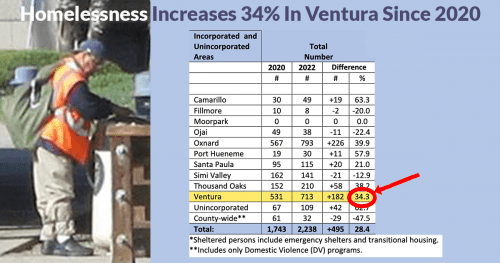
Homelessness increased by a staggering 34% between 2020 and 2022. The city’s homeless count is 713 people. Only Oxnard, with a population twice the size of Ventura, has more.
Ventura’s homeless shelter is operating, although Covid-19 procedures reduced its capacity. It costs the city $712,000 annually to house 55 of its 713 homeless. Last year, the city spent the same amount to house 27 homeless people.
Shouldn’t the Council and Ventura’s citizens know how much homeless services cost and how they get allocated? What should Ventura do for those not housed in the shelter? Some of the remaining homeless are vagrants. They choose to live the lifestyle and panhandle. How do candidates plan to combat vagrancy, so Ventura is more welcoming?
Public Employee Pensions Is The Toughest Campaign Issues

Ask the candidates running in your district if they will work with the city’s unions to reform public employee pensions. The last time the City Council modified pensions was 2010, and those changes were modest.
The city staff believes pensions will level out in six or seven years. Yet, the bill came from CalPERS for this year’s contribution to the unfunded pension liability, and it was staggering. Ventura will pay $19.9M to CalPERS. Can Ventura last that long amid its other financial burdens? The city still hasn’t recovered from the Thomas Fire. The COVID-19 pandemic shuttered businesses for months, robbing the city of sales tax revenue. The new Amazon warehouse in Oxnard will further reduce Ventura’s sales tax revenue by between $700,000-$1,200,000.
Campaign Finances
The elections in 2020 were the costliest in history. Since district elections began, candidates have been spending more each election cycle.
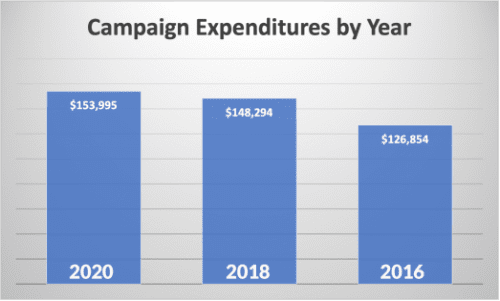
The rising expenditures seem odd. By moving to districts, each candidate needs to reach a smaller number of potential voters (15,000 instead of the entire city). City officials intended district voting to help candidates spend less to be elected. Rather, district voting has had the opposite effect.
Voter turnout was high for the 2020 election. Presidential election years always bring out more voters. That was the case for the 2020 presidential election, a contested battle. Being an off-year election, the voter turnout in 2022 will be like the turnout in 2018.
We will track the candidates’ campaign finance reports to report this year’s totals.
Growth Is Always Among The Key Campaign Issues

Growth means different things to different people. Yet, it’s inescapable that Ventura needs to grow.
Ask if your candidates acknowledge that growth, jobs and water availability are inseparable. They also need to recognize and respect the opposition to building more houses with greater density and height throughout the community. Forward progress on growth means accommodating, integrating and compromising.
Editor’s Comments
Voting works best when people take the time to learn about campaign issues. We urge you to get involved. Educate yourself on the candidates’ positions on the campaign issues for 2022. We’ve provided a framework to ask pertinent questions. Use ours or develop your own but find out where the candidates stand.
Don’t succumb to the political feel-good clichés candidates use to attract your vote. Candidates always discuss growth and public safety while campaigning. Look beyond that. These are not the pressing campaign issues in 2022. The most demanding issues are water, labor contracts, long-term planning and service reductions. These problems with budgets, growth and water have happened over the last fifteen years. Ask yourself, “Do these candidates have the capabilities to solve these problems?”
Once elected, it’s vital to review the new Councilmembers’ performance. Elected representatives gloss over accountability and transparency while in office. They only give them “lip service” during election time. In the past, Councilmembers knew voters would forget their campaign promises over the next four years. It’s up to each of us to make sure that our elected officials do what they promised to do.
We respect anyone who steps up to run for office. Furthermore, we recognize it is difficult to subject yourself and your family to public scrutiny. So, regardless of the election outcome, we applaud everyone who threw their hat in the ring.
Tell the Council What You Believe Are the Real Problems Facing Ventura
Below you’ll find the photos of our current City Council. Click on any Councilmember’s photo and you’ll open your email program ready to write directly to that Councilmember.
 |
 |
|
 |
 |
|
 |
 |
|
 |
For more information like this, subscribe to our newsletter, Res Publica. Click here to enter your name and email address.


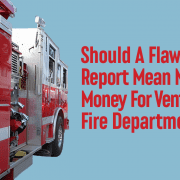

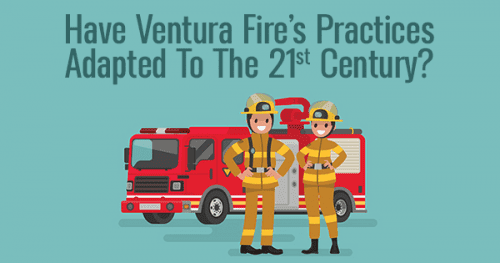
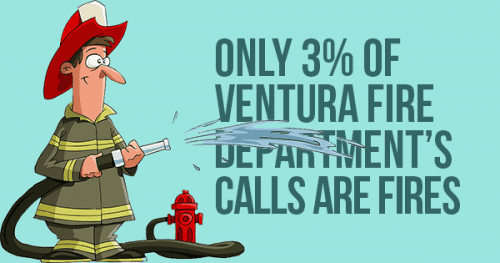 Ventura Fire was initially designed to fight fires. Over time, their duties expanded to include safety inspections, and they built their processes to meet those needs. It was a model that had worked. After all, it was a 100-year-old tradition. Firefighters waited in the firehouse to be dispatched to an emergency.
Ventura Fire was initially designed to fight fires. Over time, their duties expanded to include safety inspections, and they built their processes to meet those needs. It was a model that had worked. After all, it was a 100-year-old tradition. Firefighters waited in the firehouse to be dispatched to an emergency. Second, the review presents detailed costs associated with each of its recommendations.
Second, the review presents detailed costs associated with each of its recommendations.  Fifth, ESCI recommends on
Fifth, ESCI recommends on 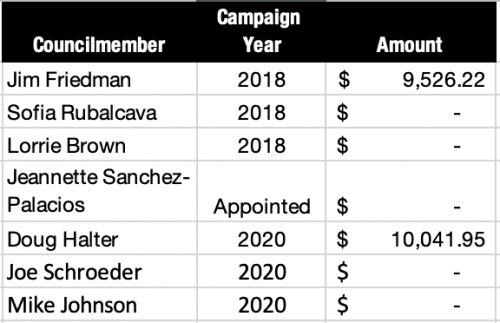
 The crucial, objective metric on which residents can judge Ventura Fire is response time. And VFD’s response time is in the 90th percentile. It will be hard to improve on that.
The crucial, objective metric on which residents can judge Ventura Fire is response time. And VFD’s response time is in the 90th percentile. It will be hard to improve on that.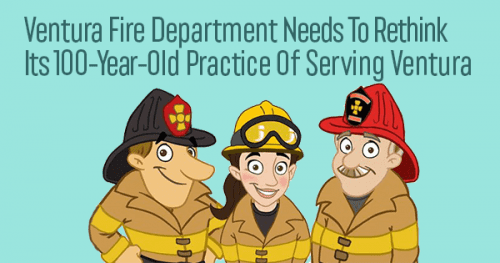 In the end, progress will happen if Ventura Fire
In the end, progress will happen if Ventura Fire 



 The most practical option available to the Council was to appoint a replacement. Four of the Councilmembers didn’t want to wait for a special election in November 2021. Nobody wanted to wait until November 2022 to fill the vacancy because of the concern about not having a seventh vote to break any tie vote.
The most practical option available to the Council was to appoint a replacement. Four of the Councilmembers didn’t want to wait for a special election in November 2021. Nobody wanted to wait until November 2022 to fill the vacancy because of the concern about not having a seventh vote to break any tie vote.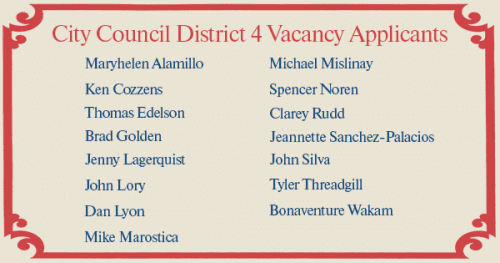
 The logistics of the procedure are grueling for both the applicants and the City Council. Interviewing all fifteen candidates in one sitting will be wearisome. It’s hard to imagine that the Councilmember’s attention will be as sharp at the end of the day as it was in the beginning.
The logistics of the procedure are grueling for both the applicants and the City Council. Interviewing all fifteen candidates in one sitting will be wearisome. It’s hard to imagine that the Councilmember’s attention will be as sharp at the end of the day as it was in the beginning.
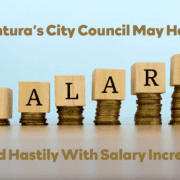



 The Council made its November decision based on data presented on September 23, 2020, a month and a half earlier. The Council received no updated data on which to decide. If they had, the decision might have been different.
The Council made its November decision based on data presented on September 23, 2020, a month and a half earlier. The Council received no updated data on which to decide. If they had, the decision might have been different. estimates are optimistic. “We believe we’re conservative not to paint too bleak a picture,” Mr. Coon told the City Council on January 11, 2021. And, our City Council makes long-term decisions based on the short-term data they receive.
estimates are optimistic. “We believe we’re conservative not to paint too bleak a picture,” Mr. Coon told the City Council on January 11, 2021. And, our City Council makes long-term decisions based on the short-term data they receive. It seems clear that city staff provided fluid, optimistic data to the Council for their decision. Mr. Coon explained the projections, saying, “We are feeling alright with the additional projection of $1.5 million in Sales Tax for the current fiscal year. It is something that we definitely want to keep an eye on, especially if we start to see more businesses close.
It seems clear that city staff provided fluid, optimistic data to the Council for their decision. Mr. Coon explained the projections, saying, “We are feeling alright with the additional projection of $1.5 million in Sales Tax for the current fiscal year. It is something that we definitely want to keep an eye on, especially if we start to see more businesses close.




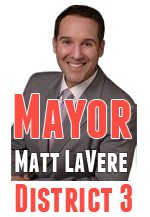






 In an interview with Rachel Woodward, she revealed that she kept meticulous notes. She has a complete phone and paper trail of all dates and times that someone spoke to her, and a list of appointments and promises broken from representatives from City Hall. Rachel felt she needed to keep these records. She got the impression that everyone at City Hall was “very defensive,” and nobody wanted to be “held responsible” for what had occurred before the June 24th meeting.
In an interview with Rachel Woodward, she revealed that she kept meticulous notes. She has a complete phone and paper trail of all dates and times that someone spoke to her, and a list of appointments and promises broken from representatives from City Hall. Rachel felt she needed to keep these records. She got the impression that everyone at City Hall was “very defensive,” and nobody wanted to be “held responsible” for what had occurred before the June 24th meeting.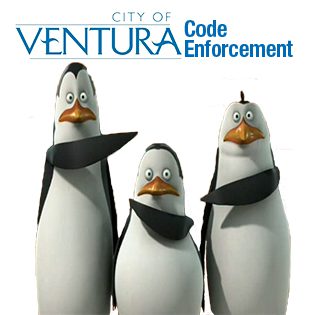 Rachel further felt that it was also apparent that few, if anyone, was in the community visiting businesses. And, when someone visited a company, there weren’t clear directions on how to streamline the process.
Rachel further felt that it was also apparent that few, if anyone, was in the community visiting businesses. And, when someone visited a company, there weren’t clear directions on how to streamline the process.





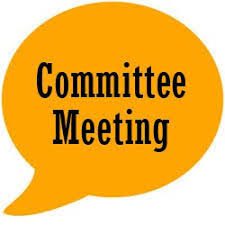 The Council has proposed some significant changes. They include:
The Council has proposed some significant changes. They include: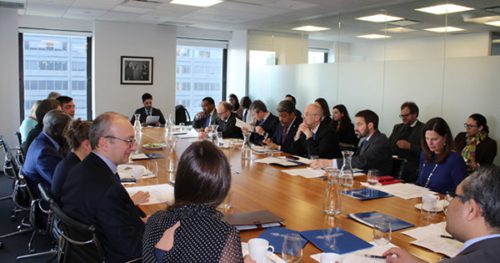 Every Planning Commissioner would be accountable to the Councilmember who appointed him or her.
Every Planning Commissioner would be accountable to the Councilmember who appointed him or her. The proposed changes don’t please everyone. The immediate resistance came from some existing committee members and commissioners. There are two main objections. Some complained about the process. Others believe there will be less transparency and citizen involvement.
The proposed changes don’t please everyone. The immediate resistance came from some existing committee members and commissioners. There are two main objections. Some complained about the process. Others believe there will be less transparency and citizen involvement.



 Costing over $500,000,000 is not the only issue. The more significant issue is that the City Council assumed DPR water was safe to drink.
Costing over $500,000,000 is not the only issue. The more significant issue is that the City Council assumed DPR water was safe to drink.  However, the Consent Decree says the court can extend the time limit in the event of construction constraints, financing problems, or an emergency. It requires Ventura to petition the court requesting an extension, or an agreement with the plaintiff and their lawyers. That has not happened.
However, the Consent Decree says the court can extend the time limit in the event of construction constraints, financing problems, or an emergency. It requires Ventura to petition the court requesting an extension, or an agreement with the plaintiff and their lawyers. That has not happened. On February 4, 2019, Council Member Jim Friedman asked our City Attorney, Gregory Diaz about extending the deadline.
On February 4, 2019, Council Member Jim Friedman asked our City Attorney, Gregory Diaz about extending the deadline.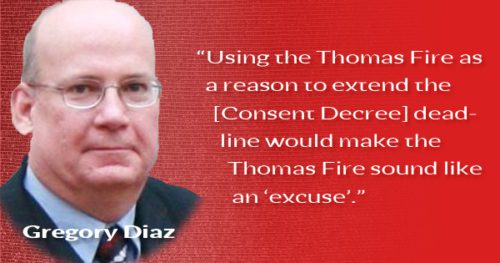




 Ventura Water forces the City Council to get their information from the General Manager. Thus bypassing the entire reason the city established the Water Commission.
Ventura Water forces the City Council to get their information from the General Manager. Thus bypassing the entire reason the city established the Water Commission. You may not have heard about the incident. It’s not because Ventura Water didn’t announce it. They did. Ventura Water fulfilled the letter of the law, but it may have missed the intent behind it. Meeting the legal requirement seems to be the minimum standard. Yet setting the bar at the lowest level may place everyone’s health at risk in the future.
You may not have heard about the incident. It’s not because Ventura Water didn’t announce it. They did. Ventura Water fulfilled the letter of the law, but it may have missed the intent behind it. Meeting the legal requirement seems to be the minimum standard. Yet setting the bar at the lowest level may place everyone’s health at risk in the future. In July, Ventura Water withheld information from the Water Commission. A panel of experts examined
In July, Ventura Water withheld information from the Water Commission. A panel of experts examined